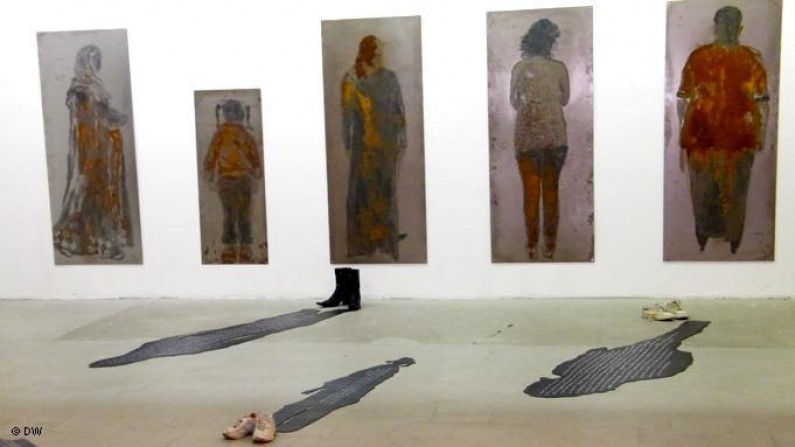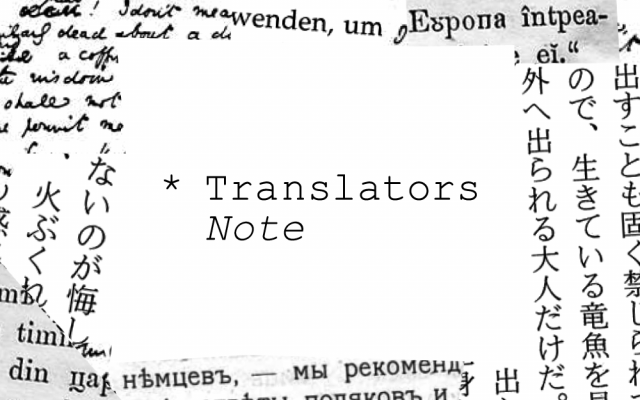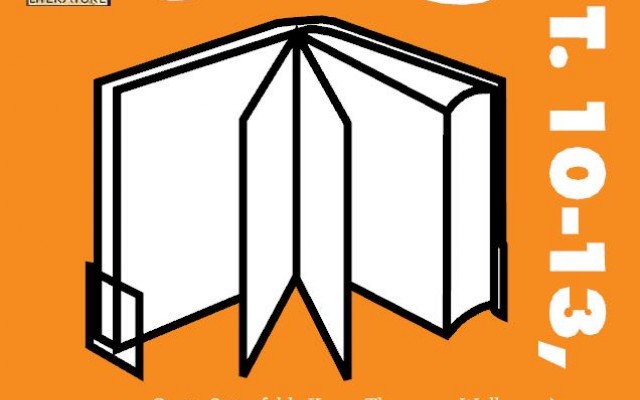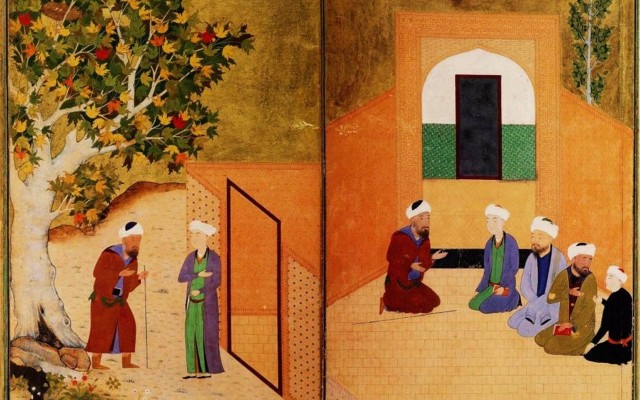Words that Build the Soul

What follows are the scripts of five episodes aired on the Dizionario segment of the radio program Fahrenheit in spring 2009, contributed to Exchanges by Somali-Italian writer Ubah Cristina Ali Farah, and translated from the Italian by Hope Campbell Gustafson. Each week an author was asked to choose a word per day for five days, following a personal criterion, and with complete freedom.
—Exchanges
At that time I was working on a project about memory with a group of young Somali refugees attending the Asinitas Italian language school in Rome. Given that we often ended up discussing the difficulty of translating words and concepts between the Somali and Italian languages, Fahrenheit’s proposal seemed full of possibility. When I suggested the project to the young people and their instructors, they welcomed it enthusiastically. We had some informal meetings in which every stimulus arose from a word and, to some extent, from the impossibility of translating it. We found terms that came close to this impossibility, and that often took us places that we hadn't expected. This is, therefore, the story of the many associations stemming from a single word.
—Ubah Cristina Ali Farah
Day One
Our word of the day is avventura.
Adventure is: something unique and special, an unexpected occurrence. A risky undertaking but attractive for what it promises of the unknown and for how it lives outside of the ordinary.
It seems that a corresponding term in Somali doesn’t exist. In the dictionary they have sursuur. Sursuur baan galay means “I took a risk.” So is risk an element intrinsic to adventure?
We continue looking. Some suggest dalmar, the crossing of countries, and also badmar, crossing the sea. For a Somali the symbolic figure of the adventurer was the siman from the English seaman, man of the sea.
During the Second World War many Somalis enlisted as mariners on English warships in the Gulf of Aden. Some returned, others never returned again.
There’s a book that came out recently by Fatima Ahmed, titled Akui. It’s a wonderful story from the perspective of the daughter of a Somali seaman who lived in Cambodia for 30 years, married an Indo-Vietnamese woman, and returned to Somalia in the seventies, fleeing from the Cambodian civil war.
Speaking of seamen, Abdulkadir (who in Somalia was a fisherman) says they aren’t true adventurers like fishermen are, because on board large boats there's no need to know the sea and the risks that you run navigating it. This brings us back, then, to the idea of the adventure as risk.
Nabad aad filaneysid nahdin ma laha is a proverb that Farhaan cited. I translated it: when seeking peace one does not feel afraid, one does not sense any risks. Are hope and the search for greener pastures the primary impetus for adventure?
Abubakar recalls that after having crossed the sea, after his adventure, he dreamed of resting, of “taking a break from extreme exhaustion.” Sometimes it’s harder to live with peace than with adventure.
For some, even crossing the city is an adventure. For those who don’t know the language and are afraid of continuous inspections by the authorities, Rome presents itself as full of unknowns. In this case, words are a reliable guide. Here is Geddi’s homage to his teacher: Macalimadda waa Kiara maadada ay qoreyso mid mid aan ka qaatan ku mara magaalada. My teacher Chiara, the words she writes, I took some of them and I use them to cross the city.
In closing, a quotation from Ambiguous Adventure, a novel written in the fifties by Cheikh Hamidou Kane. Samba Diallo, the hero of the novel, says: “It may be that we shall be captured at the end of our itinerary, vanquished by our adventure itself. It suddenly occurs to us that, all along our road, we have not ceased to metamorphose ourselves, and we see ourselves as other than what we were. Sometimes the metamorphosis is not even finished. We have turned ourselves into hybrids, and there we are left. Then we hide ourselves, filled with shame (100).”i
It's the fate of heroes to be trailblazers, to be symbols of liberation for a community. I'll leave you with one last word: sahan. It means to go on ahead, to search for green pastures for the group.
Day Two
The word we chose today, together with the teachers and students of the Asinitas Italian language school, is abbagliare: to obfuscate vision with too bright a light. From vernacular Latin, advariare has to do with the variety of colors. There is a translation of this word in Somali, cawir, “it’s when the sun is too strong and you have to cover your eyes,” said Xawa. “Cawirran is also said for someone who can’t see,” Yusuf added. “The blind.”
Speaking of not seeing, of having impeded sight, Farhaan recited a proverb: Meel il laga la’yahay il aa la istiraa—when you arrive in a land of one-eyed people, cover one of your two eyes.
“We don’t all have the same expectations,” Farhaan continued. “What I mean to say is that, since chance brought us here, we have to become part of this world, of this community.”
And he continued: “In a lesson we had a few days ago there was the story of a student who goes to a famous mu’allim and asks him to teach him the art of magic. How can I learn the art of magic? Your place is here in this garden, the mu’allim responds, you have one night to find it. In my opinion, that night is luck, it’s destiny. So I ask myself: Given that many of those who came before us weren’t successful, will we find our place? Will we have our night, our luck?”
A beautiful poem by Gezim Hajdari, Montale prize poet, springs to mind: Forgetting we are blind / we leave by night / to reach a naked territory / that needs our voice. / We're going to the sea to speak / and throw stones windward.ii
Marco Carsetti, one of the teachers at the school, mentions the expression prendere un abbaglio (to make a mistake). When you’re abbagliato, your vision is obstructed, you're incapable of seeing clearly.
Right away the students bring up the idea of a mirage. Among the many ways to say mirage, besides wirwir, there’s the term dhaan dabagaalle. Dhaan is the path to the well and dabagalle means squirrel. A mirage is the road that the squirrel takes to get water. On the one hand it represents the absurd, but Hassan says that of all the animals the squirrel is the only one that goes out when it's really hot—we say dharaar—when the sun is high, during the hottest hours of the day.
Beginning with the word dharaar, the students explain that there are countless terms tied to light and its intensity in the Somali language: barqo to indicate the first hours of the day, when the sun is lukewarm, cadceed the light of the sun when it sets and the most beautiful of all.
Words are like crystals, they need a favorable environment to take shape in. In Somalia the light has such different colors throughout the course of the day, and the seasons, that there are countless words to define it. These words also mark the divisions of time, of the day, in a different way from how we think about it here in Europe. In a reflection on sunrise and sunset Abubakar wrote a beautiful piece: “I thank God when it’s the hour of the sunrise and I pray a prayer of the Muslim religion called the sunrise. This prayer is for thanking God, and it states: ‘the time for sleep is a little death,’ and I say thanks to God who lets me live longer after a little death. Because there are many people who go to sleep but aren’t able to get up again. At the sunset and I pray a prayer that’s called the sunset to thank God who has let me live longer because there are many people who have woken up but can’t go home because of something like an accident and they didn't expect it and maybe they thought they'd do so many things but their life is already over.”
I'll end with some verses from a song by Jorge Palma, “Eternamente tu,” quoted in the epigraph of Ondjaki’s book How Many Dawns Has the Night: “time knows nothing / time is not right / time has never existed / time is our invention ... my love / we are time.”
Day Three
Just as in Italian lingua (tongue) is both the phonetic organ and the actual language, the same goes for the Somali af, mouth and language.
Farhaan and many other students from the course have reiterated more than once: “The first difficulty that you run into upon arrival here is that of the tongue. We are like a newborn baby and a newborn baby needs different things in order to grow, and this requires time.”
Several years ago I was trying to translate a traditional lullaby but couldn’t figure out one word. This word will be tomorrow’s theme. As always in these cases, I called my father in England and sang him the lyrics I hadn't understood. It’s wonderful to see his reaction in such instances, I could decide to spend my days searching for expressions that are incomprehensible to me just to hear in his voice that kind of pride that he rarely finds in the course of his days. Now I’m speaking of my father and these days I’ve also spoken of the students of the Asinitas Italian language school, but in reality I’m speaking of an entire collective history, a history in which Italy plays a large role. As it is with everyone born outside of the big cities, my father knows the language of the nomads.
In oral culture memory is considered a great virtue and is therefore encouraged and upheld with various strategies, for example through the luuq—the tonality of the song—lyrics are enunciated. Luuq is different from luuqad, which means spoken tongue, both in Somali and in Arabic.
The Asinitas students, who haven’t had a true scholastic education, remember more songs, sayings and poems than those who have, and they frequently embroider them with their own voices. This playful and incredibly creative vein in the educated people such as my father, for example, has been lost. Once my aunt told me that as a child they’d called him Af Dabeyl, which means mouth of wind (or maybe language of wind) because in the dugsi, the Koran school, he was one of the students with a better memory. To this archaic, ritualistic, savory tongue, his deep knowledge of Italian was added. Not to glorify him alone, there are many like him from his own, and from other, generations.
What I mean to say is that the Somali-Italian dictionary exists for a reason. Those experts who worked on the Somali-Italian dictionary in the seventies are the same people who first put Somali in writing, a tongue with a solely oral tradition up until that point. A group of Somali-Italian experts. What did Italians care about one of the many African tongues spoken on the continent? We need to search together for an answer to this question.
The conflicts of recent times have dumped so many Somalis on these coasts. Many want to try their luck and head to the countries of Northern Europe where asylum-seekers receive better treatment. But by now word has spread and they know that since they've had their fingerprints taken here, this is the only country in which they can try to stay.
Who will be the linguistic bridge for these people, as they were for the Somalis of previous generations, of those intellectuals scattered around the world who speak Italian as if it were their own tongue, the tongue in which they were educated? Most of them are in England, Canada, Holland, and in the United States as political refugees.
Last year I was in London and was walking with my father and some of his friends. I realized that when they were in the vicinity of Italians (and in London there are many) they would all inadvertently raise their voices. It was unconscious, but it seemed as though they wanted to send a message. In England they are common refugees. And the tongue they studied as children, the culture they know and to some extent admire (because this is always the feeling of the colonized, a feeling of both love and hate towards the ruler), is Italian.
This Sunday I was talking with a friend, Zahra Osman, who is working in Bari as an interpreter. “Those of us who are here and are witnessing this new wave,” she said. “We have to be prepared to draw out something good from this tongue and its ties with Italian. A tongue means too many things.”
Xawa, one of the students at the school, told me something strange today. She’d gotten a phone call from her daughter back in Mogadishu, who’d told her that being without a mother was like being a head whose tongue had been cut off. What is a head worth without a tongue?
I’ll end with the verses of a poem by Grace Nichols, and I quote: “I have crossed an ocean / I have lost my tongue / from the roots of an old one / a new one has sprung.”
Day Four
Yesterday I told you about a lullaby sung over the telephone and about a word I was unable to translate. The lullaby goes like this: Hobey hobeeya a / Yahobey hobeyaa.
And the missing word, that I find very intriguing, is carrabay. It means to leave in the afternoon. You’d leave in the afternoon only in the case of serious calamity, when you’re obligated to, because leaving in the afternoon, in the middle of the day, means leaving many things unfinished.
It’s very moving to hear the students’ stories about the moment they decided to leave. It’s something they continue to think about through the years, like an obsession. Almost no one speaks of a single cause, though there may have been be a straw that broke the camel’s back, but in the end deciding to separate yourself from your home is very difficult, it’s like admitting defeat.
Leaving is often something abrupt.
One of the young men who attend the Italian course is named Farhaan, whom I’ve mentioned various times these past few days. His story is perhaps the one that hits us the most, because of its repeated departures. His was a pilgrimage from one country to another, first to Yemen, then South Africa, and eventually Italy. Between these destinations he always returned home. It’s as though his leaving was always limited by the desire to return. The first time he left in the afternoon he was only 15 years old and he’d left his city Beledweyne in order to save himself from the conflict. He ran and ran for 60 kilometers, he says. He ran for 23 hours in a row, just less than an entire day.
Then he waited: Some days later the war reached him, even in the town where he’d taken refuge. To save himself he jumped into the river and crossed to the other side. Several people followed him, but they didn’t make it and instead were trapped in the river.
The main reason for leaving, almost like an exorcism, is mentioned only occasionally. It’s the civil war, dalgalka sokeeye in Somali. In his novel Links, the writer Nuruddin Farah explains the significance of this expression in this way: “Dagaalka sokeeye […].” In his mind, Jeebleh couldn’t decide how to render the Somali expression in English: In the end he preferred the notion of “killing an intimate” to “warring against an intimate.”
This idea of intimacy, inherent in violence, is very interesting. Maybe this is another reason for their shame, for the reason why the students rarely use this expression.
They don’t say civil war, but rather burbur, which means shattering. While I was in the middle of the shattering, I decided to enter the journey.
But before entering the journey, they make several attempts. They have to have titanic strength to do so. And whoever has that strength tries everything, even while still at home. Abubakar, for example, formed a group together with some of his peers whose motto was, “lower the rifle, raise the pen.” Carrying a rifle couldn’t be the only possible assignment. Abubakar was forced to leave, pushed to by his mother after being repeatedly threatened with death. Raise the rifle, lower the pen.
Abdulkadir sang a song. We listened to those words and forgot the conflict, the hardships, the impossibility of educating ourselves. Dulaayo soconaayaa / dhuxuntii aan doonaayaa / dalkayga aan ka dhoofaayaa / dirirta aan ka carrarayaa. Walking—I fly, I look for a way out, I leave my country, I flee the contention.
Day Five
The last word we chose is casa. In English house and home aren’t the same thing—home is intimacy, the dwelling, the soul's place. There’s a similar difference between guri and daar, although with other nuances.
When I left my casa I was seventeen. My son had just been born so when leaving I wasn’t worried about bringing a lot with me, both because I was sure I'd be back and because I cared most of all about saving the child. I set him down on one of those pillows for newborns and wrapped myself in a very long black veil. Shortly before leaving, the thought that I wouldn’t be able to return crossed my mind, so I took my most recent diary with me. A few hours later the house was stormed and ransacked. I saw the scraps scattered all around the neighborhood. For a moment I felt a strong sense of dismay, thinking about all the books, the drawings, the diaries, even the clothing that I’d loved. A kind of mourning, for a fraction of a second. It still troubles me, because as a result of that experience I’m extremely disaffected, distanced from objects.
In Somalia these past eighteen years everything has worked, in Abubakar’s opinion, and all that's missing is the law. Farhaan says this motto applied: ku qabso ku qadimeysid, occupy and you won’t be left with empty hands (you won’t be left without food).
He says this in regards to the house where he lived in the city of Beledweyne, reclaimed by other property owners overnight. They’d even contracted some mercenaries to discourage possible witnesses. “You can change your house,” Hassan said, “but it's difficult to move your home.”
Yet Somalis are traditionally nomads, they load their casa on camels to move to fatter pastures.
Sangub, Somali poet and playwright, writes: During a nighttime move there are shouts, there are screams, the water urns are poorly packed, how hot it is, how dark is the time when I awoke!
Hassan says the refugee shelter where he now lives is the place where he eats and sleeps, yet it isn't his true home. “I can say that the school feels much more like my home,” he adds. At the school niidda aa laguu dhisaa, they encourage you, they motivate you, literally: they build your soul. I love this expression, build the soul.
Perhaps the soul is our first dwelling, the place in which we must learn how to live with ourselves?
It’s not easy to sleep in dorms where the sick are mixed in with the healthy, the murderers with the honest, as Abdulkaadir has said over and over. Or to sleep in a room where the radio and television are permanently on.
“We’ve already spoken with office number 43, which has never done anything about the sociability of the center,” Farhaan writes.
Speaking of sociability, a theme that is often repeated is that of hospitality. Both sociability and hospitality have to do with relationships, with the rules that we give to these relationships.
“Back when we had a government, if you found yourself in a store and a foreigner came in, you let him go in front of you. Everyone made an effort, because the man wasn’t in his own country and we had to make him feel welcome. Here this rule doesn't seem to be respected. It’s not just the Italians who aren’t hospitable, sometimes not even the Somalis are, the old coins as they’re called, those who’ve lived in Italy for years. Different from the Titanics who’ve arrived with the recent landings, practically shipwrecks.” Titanics and old coins, two categories.
It’s not the walls that make the places we live a home.
It may be the relationships that help us lay the foundation, to build the soul, protection and solace at the same time. So we can always carry our home with us, our home can travel.
I’m the one / Who goes away, writes the poet Sujata Bhatt. I’m the one / Who always goes / Away with my home / Which can only stay inside / In my blood - my home which / does not fit / with any geography.
(i) Translated by Katherine Woods.
(ii) Translated by Sarah Stickney.
Translator’s Note
All the translations, unless otherwise indicated, are mine. Thanks to Fartun and Mohammad at the Somali Mall in Minneapolis for conversing with me about the Somali proverbs, songs, and concepts found in this text.



